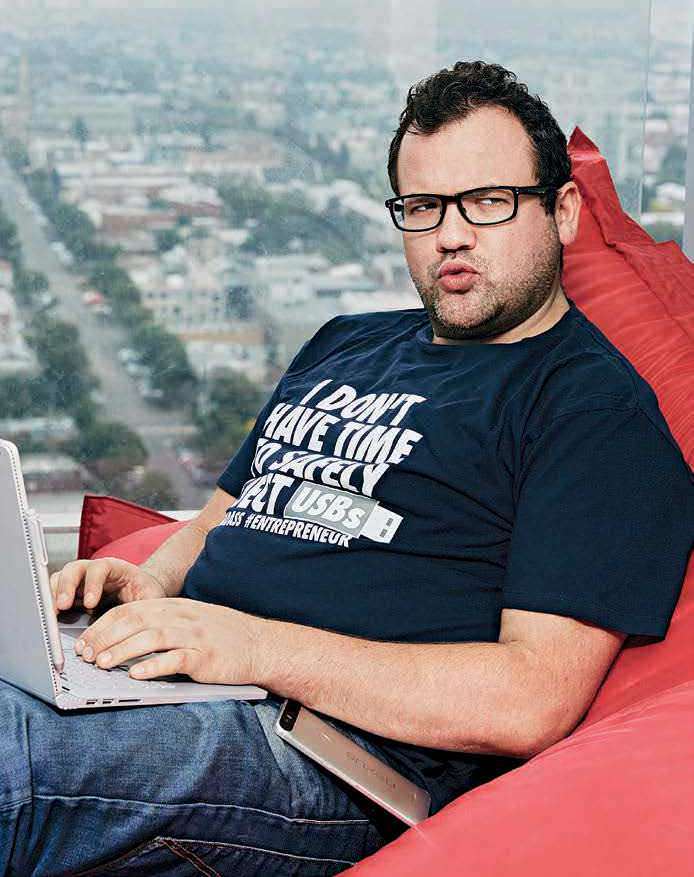From 1,000 cheap TVs to an Australian online retail empire.

Australia’s most aggressive online retailer got its start with an impulse buy. A decade ago, Ruslan Kogan was living in Melbourne, fresh out of school and doing consulting work for Accenture. At night, he made extra cash selling imported T-shirts and wallets on EBay. He decided to lay out some of his savings on a high-end, $5,000 TV but didn’t want to pay full price.
On a whim, Kogan contacted the brand’s little-known Asian manufacturer. He posed as a retailer, claiming he’d be interested in buying 100,000 TVs if the company would send him a sample unit for cheap. The TV maker made him a way better offer: all 100,000 for $1,000 a pop. “In that moment, I thought, There is a real gap in the market here,” Kogan recalls. “I quit my job, and my mum cried because I was going to become a TV salesman.”
It proved to be a good bet. Kogan couldn’t afford to pay for 100,000 TVs, but he persuaded the manufacturer to sell him 1,000 at a deep discount. They were the first items he branded with his name and sold on his website, Kogan.com, now one of Australia’s fastest-growing businesses. The site makes most of its money selling Kogan-branded electronics and other private-label gear. Five years ago it moved $14 million in goods; Kogan estimates this year’s total will top $356 million.
Kogan, now 33, was one of the first in Australia to master online retail. That’s partly because the country’s traditional retailers, such as Harvey Norman, were slow to embrace the Internet and build easy-to-navigate websites, says Steven Noble, senior analyst at Australian researcher Telsyte. “Ruslan was one of the first people to form direct relationships with the manufacturers in China,” Noble says. “He got there early and became a big player.”
هذه القصة مأخوذة من طبعة March 14 - March 20, 2016 من Bloomberg Businessweek.
ابدأ النسخة التجريبية المجانية من Magzter GOLD لمدة 7 أيام للوصول إلى آلاف القصص المتميزة المنسقة وأكثر من 9,000 مجلة وصحيفة.
بالفعل مشترك ? تسجيل الدخول
هذه القصة مأخوذة من طبعة March 14 - March 20, 2016 من Bloomberg Businessweek.
ابدأ النسخة التجريبية المجانية من Magzter GOLD لمدة 7 أيام للوصول إلى آلاف القصص المتميزة المنسقة وأكثر من 9,000 مجلة وصحيفة.
بالفعل مشترك? تسجيل الدخول

Instagram's Founders Say It's Time for a New Social App
The rise of AI and the fall of Twitter could create opportunities for upstarts

Running in Circles
A subscription running shoe program aims to fight footwear waste

What I Learned Working at a Hawaiien Mega-Resort
Nine wild secrets from the staff at Turtle Bay, who have to manage everyone from haughty honeymooners to go-go-dancing golfers.

How Noma Will Blossom In Kyoto
The best restaurant in the world just began its second pop-up in Japan. Here's what's cooking

The Last-Mover Problem
A startup called Sennder is trying to bring an extremely tech-resistant industry into the age of apps

Tick Tock, TikTok
The US thinks the Chinese-owned social media app is a major national security risk. TikTok is running out of ways to avoid a ban

Cleaner Clothing Dye, Made From Bacteria
A UK company produces colors with less water than conventional methods and no toxic chemicals

Pumping Heat in Hamburg
The German port city plans to store hot water underground and bring it up to heat homes in the winter

Sustainability: Calamari's Climate Edge
Squid's ability to flourish in warmer waters makes it fitting for a diet for the changing environment

New Money, New Problems
In Naples, an influx of wealthy is displacing out-of-towners lower-income workers